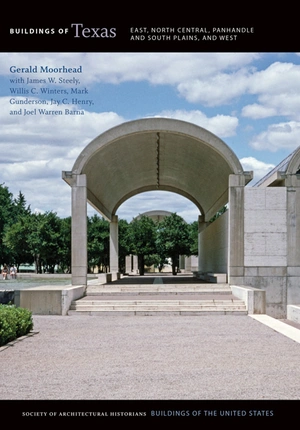
The first church on this site was constructed with limestone supplied by and laid under the supervision of local stonemason William Floyd, who was injured by a falling stone and later died. Rusticated stones from the dismantled original building were reused in the construction of the base and the two towers of the building as completed in 1911. The contractor was Jacob Fein, a German immigrant who worked on the Texas State Capitol before moving to Honey Grove in 1884. Dallas architect James Edward Flanders used cast stone to outline the pointed-arched windows and for the stringcourses to contrast with the pressed red brick of the new walls. The different materials and colors result in a highly polychromatic work. The symmetrical towers are unusual in Flanders’s work. The two-stage towers have bracketed cornices with pinnacles on each corner and convex polygonal domes.

